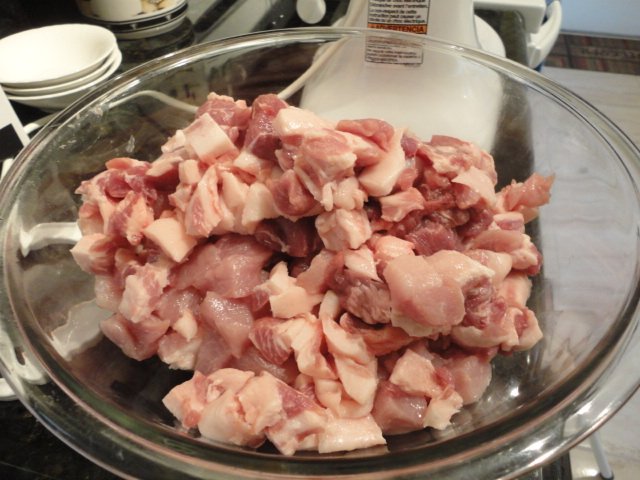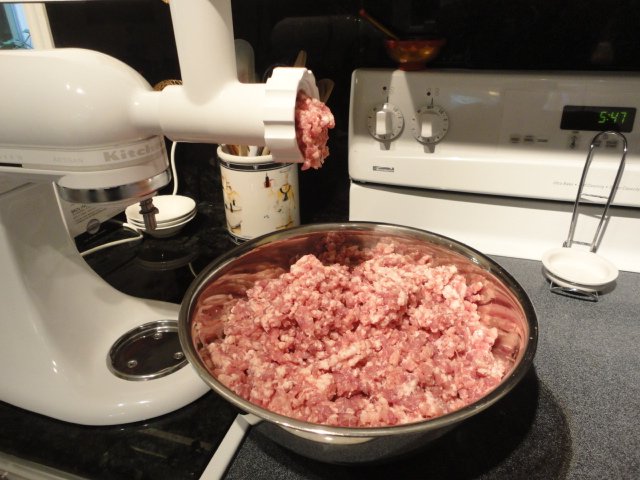A part of the experience of making homemade sausage is the process of making your own ground or minced meat. This is not to say that you cannot purchase the ground meat at the grocery store or have the butcher grind selected meats for you, but it does take away from the experience in my opinion.
Personally, I would be hesitant to use purchased ground meat for two reasons. First, although the percent lean is posted, most ground meat will not have the right ratio for sausages. Second, you are not in control of the coarseness of the grind. Potentially, the packaged meat in the grocery store is too finely ground.
When I am in the grocery store I am constantly looking for whole boneless pork loin that is on sale. I prefer to purchase vacuumed packed pork loin so that I can keep the meat in the freezer until I am ready to make sausage.
Due to the heavily trimmed nature of the Boneless Pork Loin (see above picture), I also purchase on the the day of grinding, Pork Fat Trim from the local Hispanic grocery store. You can also ask your local grocery store butcher counter if they have any Pork Fat Trim available for purchase. For the majority of the sausages that I make, I use 3 pounds of Pork Loin to 1 pound of Pork Fat Trim.
I find that the meat and fat diced into cubes around one inch works best with the Kitchen Aid Meat Grinder. It is best to mix the meat and fat cubes in a bowl to begin the process of evenly distributing the meat and fat.
The grinding process is as simple as dropping the cubes of pork into the feeder chute leading towards the auger and every now and then using the push tool to push the meat towards the auger.
Not only is the process of grinding meat for sausage in the kitchen an easy process, but there are a number of additional uses for the meat grinder. Making your own ground beef, chicken, turkey, lamb, veal and dependent on the need, being able to control the ratio of fat to lean not just for sausage but any number of recipes calling for ground meat. There are times when I am looking for ground lamb or veal and I am unable to find it in the grocery store when I am looking to make homemade Italian meatballs. I can also imagine that depending on prices, there are times when a cut of meat will be cheaper per pound then it’s ground equivalent.
The Sausage Grinder Attachment for the Kitchen Aid comes with two grinding plates and I always use the larger diameter hole plate for making sausage. Although I am not concerned with the Kitchen Aid motor failing, I did find that grinding 24 pounds of meat and fat at one time did make the mixer hot. I would suggest no more then 16 pounds of grinding at one time, not to mention 16 pounds of ground meat makes a lot of sausage (approximately 64 – 80 links).






6 comments
Skip to comment form
I just bought a beef tenderloin and plan on doing this. First I need a meat grinder. Lol. Nice to meet you.
Thank you for the clear instructions on grinding my own pork. I plan to make chorizo and can’t find any ground pork so I just purchased the kitchen aid grinder and was looking for what cut of pork to buy. This was very helpful.
i am laughing so hard as the person who is going to grind filet mignon. How funny.
Question: I asked the grocery store butcher to grind a boneless pork tenderloin weighing 2.25 pounds. The package of ground pork I received weighed only 1.5 pounds. When I questioned this he said that was normal loss due to the grinder they used. Does this make any sense? Thanks in advance for your reply.
There could be some difference in weights because of meat left behind in the grinder, but hopefully you only paid for 1.5 pounds of ground pork
The old sausage mince recipes also used mace